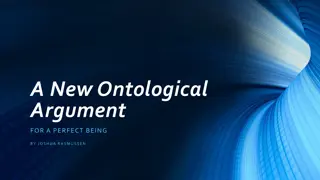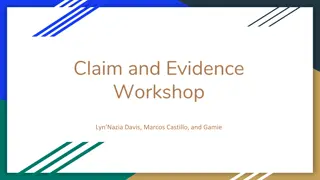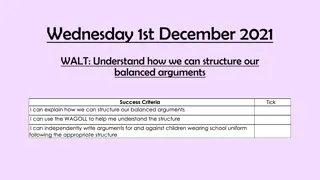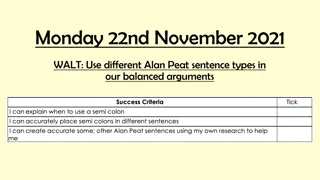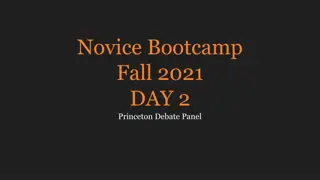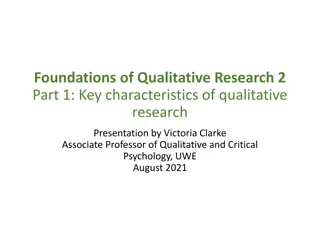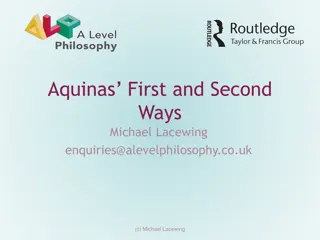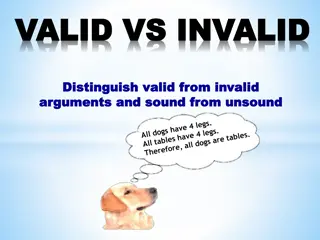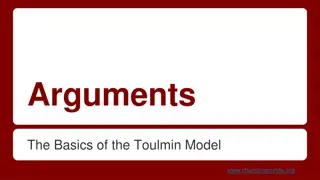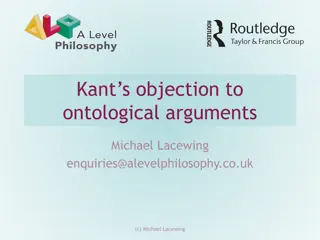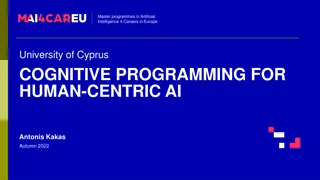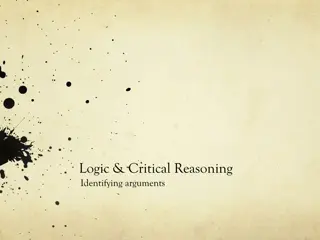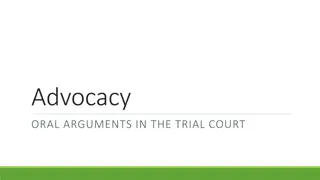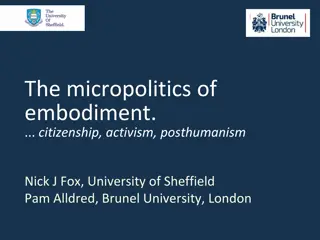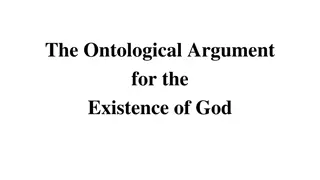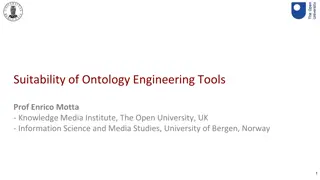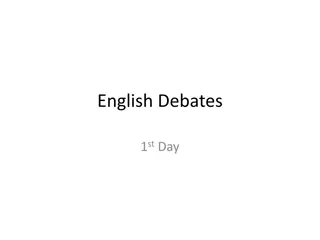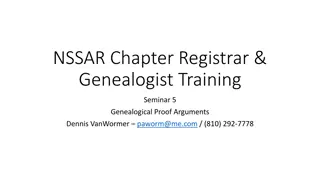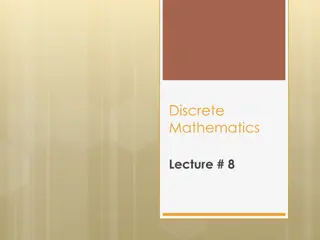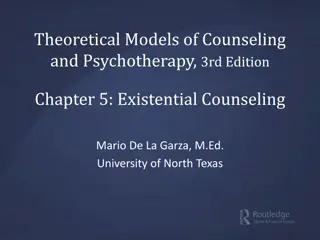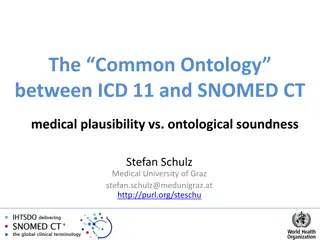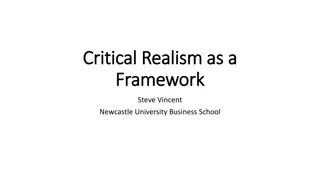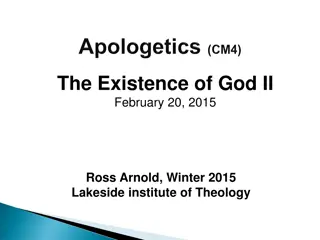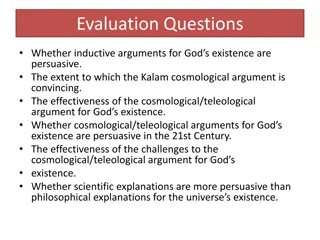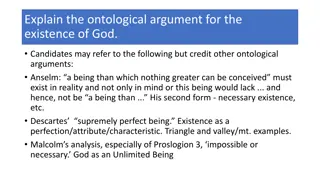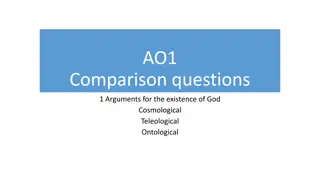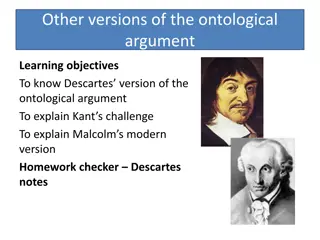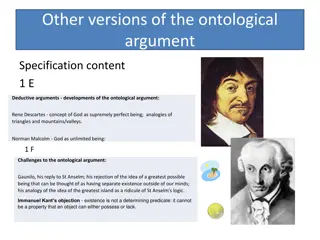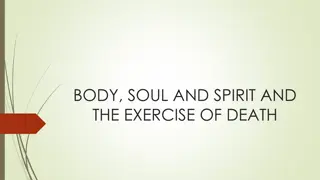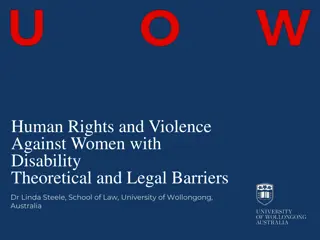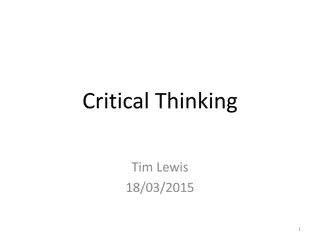Debate on Driving Skills: Are Women Better Drivers Than Men?
In this lesson students examine the debate on whether women make better drivers than men. The essay explores different perspectives, highlighting qualities such as patience and responsibility in women that may contribute to safer driving. Conversely, arguments against women drivers focus on perceive
2 views • 12 slides
A New Ontological Argument
Explore a pathway from the concept of God to the existence of God by examining obstacles in reasoning such as empty concepts, empty worlds, and the limits of reason. Refute misconceptions and provide a larger perspective on the results.
0 views • 28 slides
Mastering the Toulmin Method for Constructing Persuasive Arguments
Learn how to effectively structure arguments using the Toulmin Method, which consists of Claim, Data, Warrant, Backing, Counterclaim, and Rebuttal elements. Explore reasoning and logic concepts, differentiate between inductive and deductive reasoning, and understand how to construct valid arguments
0 views • 30 slides
Understanding the Structure of Balanced Arguments
Explore the concept of using the third person in writing balanced arguments to maintain objectivity and structure. Learn about third person pronouns and the importance of being unbiased in your writing. Understand the significance of structuring your arguments and maintaining a clear order for effec
0 views • 11 slides
Mastering Alan Peat's Balanced Arguments with Different Sentence Types
Explore the use of various Alan Peat sentence types in crafting balanced arguments, focusing on incorporating semi-colons effectively. Engage in interactive activities and practice sessions to enhance your skills in creating compelling arguments. Dive into examples and exercises to refine your under
1 views • 12 slides
Mastering Debate: Essential Strategies and Techniques
Learn key concepts like argument structure, points of clarification, and how to make compelling arguments in a debate setting. Discover the importance of warrants, impacts, and implications in formulating strong arguments. Explore tips on coming up with effective arguments and understanding differen
0 views • 47 slides
Mastering Final Focus in Debates
Final Focus, a crucial 2-minute speech at the end of a debate, serves as your last chance to persuade the judge of your victory. It involves comparing key voters and emphasizing the impact of your arguments. Weighing key voters is essential, with a focus on demonstrating why the scale tips in your f
1 views • 4 slides
Exploring Key Characteristics of Qualitative Research in Psychology
The lecture series delves into the values, characteristics, and theoretical foundations of qualitative research, emphasizing the differences from quantitative methods. It explores experiential and critical qualitative camps, subjectivity, reflexivity, and ontological and epistemological foundations.
4 views • 18 slides
Exploring Aquinas' Arguments for the Existence of God
Aquinas presents compelling arguments for the existence of God through the First and Second Ways, highlighting the necessity of a first cause and sustaining causes in the world. By delving into concepts of temporal and sustaining causes, Aquinas builds a philosophical framework that leads to the con
6 views • 16 slides
Understanding Reasonable Arguments vs. Pseudo-Arguments
The provided content focuses on distinguishing between reasonable arguments and pseudo-arguments through thought-provoking questions such as the ethical treatment of animals, city subsidies for sports venues, and subjective opinions on aesthetics. It also explains the structure of an argument, highl
0 views • 18 slides
Understanding Valid and Invalid Arguments in Logic
In logic, arguments consist of premises supporting a conclusion, with deductive arguments claiming logical necessity. Valid arguments have premises implying the conclusion, making them deductively valid. For example, if all actors are robots and Tom Cruise is an actor, then logically Tom Cruise must
0 views • 25 slides
An Examination of Ontological Arguments for God's Necessary Existence
Various ontological arguments, such as Malcolm's and Anselm's, propose that the existence of God is logically necessary, grounded in the concept of God as the greatest possible being. These arguments challenge the coherence of the concept of God and counter objections, like Kant's claim that existen
2 views • 10 slides
Understanding the Toulmin Model for Effective Argumentation
The Toulmin Model provides a structured approach to crafting and evaluating arguments, consisting of key components like claims, grounds/data, and warrants. It emphasizes the importance of using evidence and reasoning to support claims effectively. By understanding this model, one can enhance the pe
0 views • 13 slides
Kant's Critique of Ontological Arguments
An exploration of Kant's objection to ontological arguments, examining the flaws in the reasoning of Anselm and Descartes. Kant argues that existence is not a predicate and does not enhance the concept of a being. Therefore, ontological arguments cannot prove the existence of God solely through conc
0 views • 7 slides
Understanding Argumentation and Realization in AI Master Programmes
Exploring the concept of argumentation and its realization in artificial intelligence master programmes, focusing on the construction, evaluation, and implementation of arguments through cognitive programming. The framework involves structured argumentation, conflict relations, and strength/preferen
1 views • 31 slides
Understanding Logic and Critical Reasoning: Identifying Arguments
In the study of logic and critical reasoning, identifying arguments is a fundamental task. Arguments consist of premises supporting a conclusion, and they can be identified by specific indicators and techniques. Understanding argument structure and types of support, such as deductive and inductive,
2 views • 15 slides
Guide to Oral Arguments in Trial Court
Learn how to conduct oral arguments in a trial court, including the steps for both the movant and respondent, strategies for making strong arguments, and tips for responding effectively. This comprehensive guide covers the dos and don'ts of oral arguments, emphasizing the importance of preparation,
0 views • 9 slides
Exploring Embodied Citizenship from a Materialist Perspective
This exploration delves into the concept of embodied citizenship through a materialist lens, challenging essentialist and sociological viewpoints. It discusses the ontological implications of materialism, emphasizing the contextual capacities of bodies and dissolving dualisms seen in traditional per
0 views • 22 slides
Understanding Anselm's Ontological Argument for the Existence of God
Anselm's Ontological Argument posits that the greatest possible being, referred to as God, must exist in reality because existing in reality is greater than existing only in thought. This argument centers on the concept of necessary vs. contingent beings and the idea that the greatest being cannot e
0 views • 32 slides
Supporters of Slavery in the 19th Century: Legal, Religious, and Economic Arguments
In the 19th century, defenders of slavery utilized legal arguments by denying citizenship rights to blacks, religious arguments by justifying ownership and guidance through biblical references, and economic arguments by comparing treatment of slaves in the South to conditions of workers in the North
0 views • 4 slides
Understanding Command-line Arguments and Errors
Learn how to utilize command-line arguments in Python scripts to enhance flexibility and parametrize functions for various inputs. Explore ways to access and utilize command-line arguments effectively, while handling errors gracefully.
0 views • 30 slides
Challenges and Opportunities in Ontology Engineering Tools
Prof. Enrico Motta discusses the limitations of current ontology engineering tools, emphasizing the need for better support for creating ontological specifications. The lack of tools that offer a knowledge-level perspective and assist in sensemaking, navigation, and identifying relevant definitions
0 views • 5 slides
Analyzing Arguments in English Debates: A Critical Approach
Explore and critique various arguments presented in English debates, including topics like dietary recommendations, digestion issues with Japanese rice, and driving skills in different weather conditions. Learn how to evaluate evidence, causality, and persuasiveness in arguments to develop critical
0 views • 19 slides
Mastering Academic Writing Moves: The Art of Summarizing
In academic writing, mastering the art of summarizing is crucial for persuasive arguments. By engaging in dialogue with others and summarizing their arguments, writers can strengthen their position. It is important to strike a balance between the original author's ideas and your own, emphasizing asp
0 views • 15 slides
An Overview of Debate: Propositions, Teams, and Formats
Debate is a regulated discussion between two matched sides discussing a proposition, with the affirmative arguing for change and the negative defending the status quo. The standard debate format involves constructive arguments followed by rebuttals from both sides. The roles in a debate include the
0 views • 47 slides
Understanding Contexts: A Meta-Ontological Approach
Ontologies provide a general representation of reality, but knowledge is mostly context-dependent. Analyzing different types of contexts, from linguistic to manufacturing, remains a challenge. This study aims to deepen the understanding of the ontological nature of contexts by leveraging a meta-onto
0 views • 14 slides
Genealogical Proof Arguments and SAR Standard of Proof
This detailed content covers the definitions and components of genealogical proof arguments, proof summaries, and the SAR standard of proof. It explains the importance of evidence quality, source citations, and analysis in establishing acceptable genealogical conclusions for SAR membership applicati
0 views • 22 slides
Understanding Valid and Invalid Arguments in Discrete Mathematics
Concepts of valid and invalid arguments in discrete mathematics are explored through examples. Learn how to determine the validity of arguments based on premises and conclusions. Practice using truth tables to evaluate argument forms. Enhance your logical reasoning skills in Discrete Mathematics.
0 views • 22 slides
Understanding Existential Counseling: Philosophy and Practice
Existential counseling is rooted in the philosophy of existentialism, focusing on concepts such as responsibility, freedom, and the unique subjective perspective of each individual. Rollo May's influence in this approach, along with the ontological and phenomenological underpinnings, shape the under
0 views • 24 slides
Ontological Basis in ICD-11 and SNOMED CT Harmonization
This study explores the alignment and harmonization of the ontology between ICD-11 and SNOMED CT, emphasizing the importance of a common ontological foundation for optimal interoperability in healthcare data coding and terminology. The collaboration aims to merge clinical terminologies to enhance pl
0 views • 12 slides
Exploring Critical Realism as a Framework
This topic delves into the use of Critical Realism as a framework to develop knowledge about the social world, combining conceptual parts to bridge theoretical gaps and critique existing theories. It discusses ontological commitments, realist ontology, meta-theory, and domain-specific theories, emph
0 views • 22 slides
Philosophical Apologetics: Arguments for the Existence of God
Philosophical apologetics presents various arguments for the existence of God, including the ontological, cosmological, teleological, moral, transcendental, and presuppositional arguments. These arguments cover diverse aspects such as change, causality, design, contingency, miracles, consciousness,
0 views • 10 slides
Evaluating Arguments for God's Existence in the 21st Century
Exploring the persuasiveness of inductive arguments for God's existence, assessing the Kalam cosmological argument, and evaluating the effectiveness of cosmological/teleological arguments. Delving into whether scientific explanations surpass philosophical ones, the strengths and weaknesses of these
0 views • 16 slides
Ontological Argument for God's Existence and Challenges
The ontological argument posits that a being than which nothing greater can be conceived must exist in reality, not just in the mind. Critics challenge this argument, citing issues with defining God and debating whether existence can be a characteristic. Gaunilo and Kant present criticisms focusing
0 views • 30 slides
Comparison of Arguments for the Existence of God
The comparison explores the Cosmological, Teleological, and Ontological arguments for the existence of God. It delves into the similarities and differences between key proponents such as Aquinas, Paley, William Lane Craig, and Tennant. Each argument is examined based on its form, empirical evidence,
0 views • 10 slides
Exploring Different Versions of the Ontological Argument
This content delves into various versions of the ontological argument, including Descartes' and Kant's perspectives. Descartes sought to prove God's existence through reason alone, emphasizing the innate conception of a supremely perfect being. The challenges posed by Kant and Malcolm to this argume
0 views • 24 slides
Exploring Various Versions of the Ontological Argument
This content delves into different versions of the ontological argument, including developments by philosophers like Rene Descartes and challenges posed by Gaunilo and Immanuel Kant. An exploration of the concept of God as a supremely perfect being is presented, along with key arguments and objectio
0 views • 27 slides
Understanding the Body, Soul, and Spirit Paradigm in Human Existence
Exploring the concept of ternary anthropology introduced by French anthropologist Michel Fromaget, which views humans as composed of body, soul, and spirit. This paradigm, rooted in both Eastern and Western traditions, delves into the ontological value of the mind and the overall human experience. T
0 views • 36 slides
Violence Against Women with Disability: Theoretical and Legal Barriers
Troubling the assumed dis/connections between gender, disability, the human, law, violence, and feminism. Examining epistemological, material, legal, political, and ontological limitations in addressing violence against women with disability. Discusses the prevalence, forms, and implications of viol
0 views • 11 slides
Understanding Critical Thinking, Hypotheses, and Arguments
Explore the concepts of critical thinking, hypotheses, and arguments in this informative content. Learn about the definition of hypotheses, the nature of arguments, and syllogisms. Delve into the world of logical reasoning and the foundations of thought processes.
0 views • 32 slides

